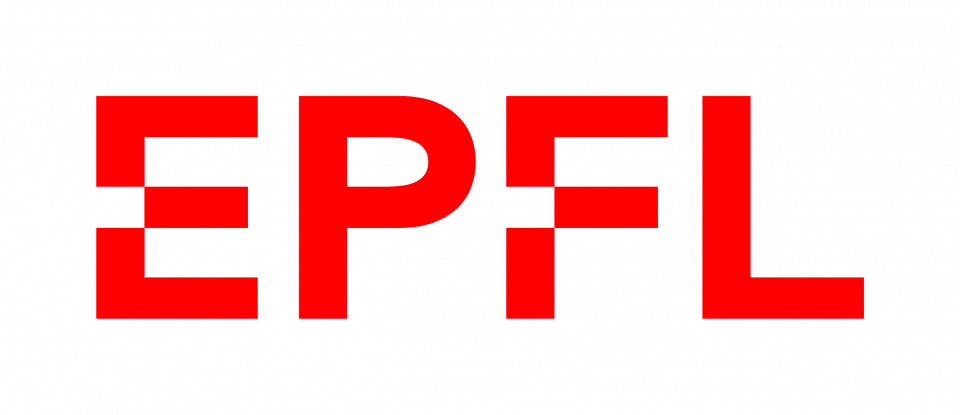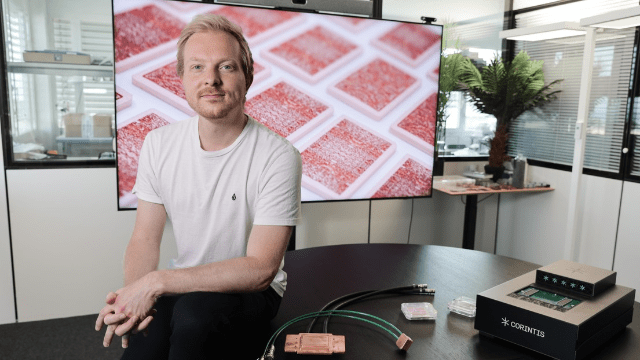Remco van Erp, CEO of Corintis: « Chip cooling will be key to the future of AI »
Building cooler chips to enable the future of computing: that's the goal of Remco van Erp and his startup Corintis. For his PhD at EPFL, Remco conducted pioneering research on liquid cooling systems that can be integrated directly into computer chips. The cross-disciplinary approach at EPFL’s POWERlab coupled with the boom in generative AI have catalyzed the growth of his startup, Corintis. The startup has just taken first place in the 2025 Top 100 Swiss Startups ranking.
Disruptive technology often results from pooling the ideas and know-how of several fields. When van Erp came to POWERlab in 2017 to do his PhD, after obtaining a master’s in the Netherlands, he was the only mechanical engineer on a team of electrical engineers involved in creating next-generation chips. “I was working on liquid cooling systems that could be placed directly on the integrated circuits being designed by my colleagues,” he says. “Sometimes they referred to me as ‘the Plumber’!” To take this cross-disciplinary approach further, van Erp founded Corintis with a friend, Sam Harrison, in 2022.
A boost from Innogrant
When he was a teenager, van Erp and his friends dreamed of developing a video game much like Flappy Bird, which was an instant global hit. “We created several apps but none of them caught on, as we clearly lacked the marketing skills,” he says. “But this experience showed us that we’d be better off studying something useful!”
Starting a business was no longer a goal for van Erp after he completed his PhD, but the opportunity fell into his lap. Some of the articles he’d published in scientific journals drew the attention of companies looking for cooling systems for their increasingly powerful processors.
“Our advantage was our cross-disciplinary skillset, which is what I tapped into as I worked on my PhD at POWERlab,” says van Erp. “We combined the expertise of chip designers with engineers specialized in cooling systems. Even now, most companies treat these as separate groups – first the chips are designed, and then they’re handed over to colleagues to figure out how to prevent the chips from overheating. But the two processes should actually be done in tandem, with designs that cut across two scales: the cooling channels are only around one hundred micron in diameter, whereas the chips are several centimeters wide.”
When AI burst onto the scene in the early 2020s, electrical engineers started to build even more powerful and highly specialized chips. “Large multinationals began developing processors for specific applications such as data centers GPUs – the workhorses behind today’s AI models,” says van Erp. In response, Corintis shifted its efforts and began developing software that can optimize the design of cooling for high-performance chips incorporating a cooling system from the outside, and started providing support for chip designers.
In the future, the capacity of high-performance chips will depend mainly on the amount of heat that we can remove.
Remco van Erp
“Because our algorithms can crunch through an array of designs, they’re the ideal development tool,” says van Erp. “We can digitally model power and temperature distributions and determine the optimal arrangement of cooling channels before the chips are produced. Our cooling systems are up to 50 times more energy-efficient than those currently used in data centers.”
Corintis obtained an EPFL Innogrant in 2021 – on the same day as van Erp’s birthday – which provided funding for one year of his salary, giving the startup a shot in the arm. “That was an important first step and enabled us to position Corintis on the market,” he says.
“Generative AI has confirmed the business case for our system”
“We’re lucky to have arrived at just the right time,” says van Erp. At first, investors found Corintis’s system interesting but “didn’t think a new generation of high-performance, specialized chips would actually hit the market and make our system necessary.” However, all that changed with the boom in generative AI, which paved the way after a successful CHF 3.85 million funding round for the company in early 2022.
In less than four years, Corintis has become one of Switzerland’s leading startups. It was ranked second in the 2024 Top 100 Swiss Startup Awards, just behind fellow EPFL spin-off DePoly, and has raised over CHF 27 million in funding. The proceeds will be used to hire additional staff and ramp up growth.
“Soon, it won’t be enough to simply cool the buildings where data centers are housed,” says van Erp. “We’re not far from the point where the processing power of high-performance chips will depend mainly on the amount of heat that can be removed before computers overheat, crash or malfunction.”
Author: Cécilia Carron

Comments0
Please log in to see or add a comment
Suggested Articles



